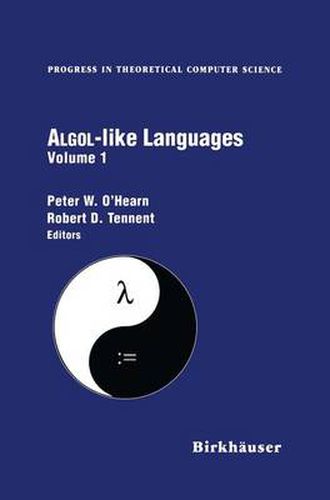Readings Newsletter
Become a Readings Member to make your shopping experience even easier.
Sign in or sign up for free!
You’re not far away from qualifying for FREE standard shipping within Australia
You’ve qualified for FREE standard shipping within Australia
The cart is loading…






This title is printed to order. This book may have been self-published. If so, we cannot guarantee the quality of the content. In the main most books will have gone through the editing process however some may not. We therefore suggest that you be aware of this before ordering this book. If in doubt check either the author or publisher’s details as we are unable to accept any returns unless they are faulty. Please contact us if you have any questions.
In recent years there has been a remarkable convergence of interest in programming languages based on ALGOL 60. Researchers interested in the theory of procedural and object-oriented languages discovered that ALGOL 60 shows how to add procedures and object classes to simple imperative languages in a general and clean way. And, on the other hand, researchers interested in purely functional languages discovered that ALGOL 60 shows how to add imperative mechanisms to functional languages in a way that does not compromise their desirable properties. Unfortunately, many of the key works in this field have been rather hard to obtain. The primary purpose of this collection is to make the most significant material on ALGoL-like languages conveniently available to graduate students and researchers. Contents Introduction to Volume 1 1 Part I Historical Background 1 Part n Basic Principles 3 Part III Language Design 5 Introduction to Volume 2 6 Part IV Functor-Category Semantics 7 Part V Specification Logic 7 Part VI Procedures and Local Variables 8 Part vn Interference, Irreversibility and Concurrency 9 Acknowledgements 11 Bibliography 11 Introduction to Volume 1 This volume contains historical and foundational material, and works on lan guage design. All of the material should be accessible to beginning graduate students in programming languages and theoretical Computer Science.
$9.00 standard shipping within Australia
FREE standard shipping within Australia for orders over $100.00
Express & International shipping calculated at checkout
Stock availability can be subject to change without notice. We recommend calling the shop or contacting our online team to check availability of low stock items. Please see our Shopping Online page for more details.
This title is printed to order. This book may have been self-published. If so, we cannot guarantee the quality of the content. In the main most books will have gone through the editing process however some may not. We therefore suggest that you be aware of this before ordering this book. If in doubt check either the author or publisher’s details as we are unable to accept any returns unless they are faulty. Please contact us if you have any questions.
In recent years there has been a remarkable convergence of interest in programming languages based on ALGOL 60. Researchers interested in the theory of procedural and object-oriented languages discovered that ALGOL 60 shows how to add procedures and object classes to simple imperative languages in a general and clean way. And, on the other hand, researchers interested in purely functional languages discovered that ALGOL 60 shows how to add imperative mechanisms to functional languages in a way that does not compromise their desirable properties. Unfortunately, many of the key works in this field have been rather hard to obtain. The primary purpose of this collection is to make the most significant material on ALGoL-like languages conveniently available to graduate students and researchers. Contents Introduction to Volume 1 1 Part I Historical Background 1 Part n Basic Principles 3 Part III Language Design 5 Introduction to Volume 2 6 Part IV Functor-Category Semantics 7 Part V Specification Logic 7 Part VI Procedures and Local Variables 8 Part vn Interference, Irreversibility and Concurrency 9 Acknowledgements 11 Bibliography 11 Introduction to Volume 1 This volume contains historical and foundational material, and works on lan guage design. All of the material should be accessible to beginning graduate students in programming languages and theoretical Computer Science.